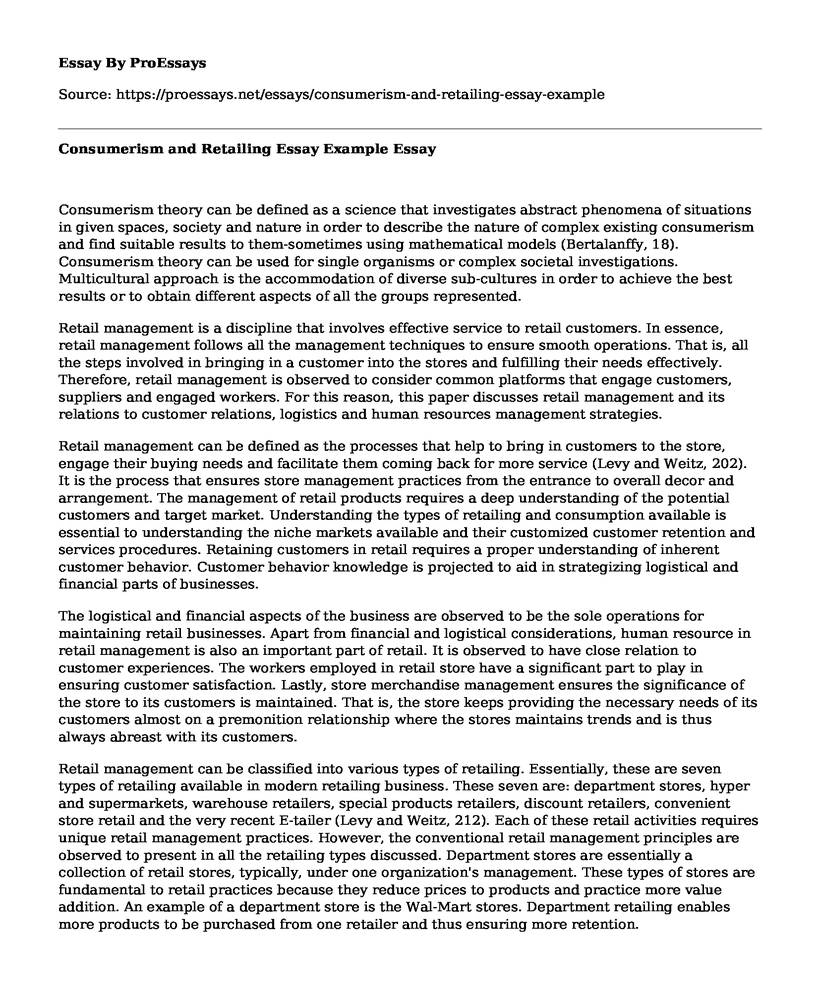Consumerism theory can be defined as a science that investigates abstract phenomena of situations in given spaces, society and nature in order to describe the nature of complex existing consumerism and find suitable results to them-sometimes using mathematical models (Bertalanffy, 18). Consumerism theory can be used for single organisms or complex societal investigations. Multicultural approach is the accommodation of diverse sub-cultures in order to achieve the best results or to obtain different aspects of all the groups represented.
Retail management is a discipline that involves effective service to retail customers. In essence, retail management follows all the management techniques to ensure smooth operations. That is, all the steps involved in bringing in a customer into the stores and fulfilling their needs effectively. Therefore, retail management is observed to consider common platforms that engage customers, suppliers and engaged workers. For this reason, this paper discusses retail management and its relations to customer relations, logistics and human resources management strategies.
Retail management can be defined as the processes that help to bring in customers to the store, engage their buying needs and facilitate them coming back for more service (Levy and Weitz, 202). It is the process that ensures store management practices from the entrance to overall decor and arrangement. The management of retail products requires a deep understanding of the potential customers and target market. Understanding the types of retailing and consumption available is essential to understanding the niche markets available and their customized customer retention and services procedures. Retaining customers in retail requires a proper understanding of inherent customer behavior. Customer behavior knowledge is projected to aid in strategizing logistical and financial parts of businesses.
The logistical and financial aspects of the business are observed to be the sole operations for maintaining retail businesses. Apart from financial and logistical considerations, human resource in retail management is also an important part of retail. It is observed to have close relation to customer experiences. The workers employed in retail store have a significant part to play in ensuring customer satisfaction. Lastly, store merchandise management ensures the significance of the store to its customers is maintained. That is, the store keeps providing the necessary needs of its customers almost on a premonition relationship where the stores maintains trends and is thus always abreast with its customers.
Retail management can be classified into various types of retailing. Essentially, these are seven types of retailing available in modern retailing business. These seven are: department stores, hyper and supermarkets, warehouse retailers, special products retailers, discount retailers, convenient store retail and the very recent E-tailer (Levy and Weitz, 212). Each of these retail activities requires unique retail management practices. However, the conventional retail management principles are observed to present in all the retailing types discussed. Department stores are essentially a collection of retail stores, typically, under one organization's management. These types of stores are fundamental to retail practices because they reduce prices to products and practice more value addition. An example of a department store is the Wal-Mart stores. Department retailing enables more products to be purchased from one retailer and thus ensuring more retention.
The second type of retailing is supermarkets. These can consist of various types of stores offering varieties of products in home appliances, food and beverages. Consequently, the supermarkets can also be customized to carry a range of products in electronics and fashion, in addition to the other essentials. In the same light, warehouse retailers are observed to have significant similarity to supermarkets. However, a huge variation is observed on location, where the warehouse retailers operate from business parks and are observed to serve larger clients. Warehousing requires less store management practice and thus offers very competitive prices with a range of products on exhibition.
Expert knowledge is essential to effective buying. For this reason, specialized retailers are the types of retailers offering special retail services to a specified market. These types of retailers operate in specific industries and markets. Therefore, special retailers offer customers expert knowledge and an addition of special accessories of the same industry. An example is specialized electrical and hardware stores. The fifth type of retailer is the convenience stores. These are retail stores located in residential areas. The stores offer limited products and services and at relatively higher prices than other stores. Convenience advantage enables the maintenance of higher prices.
Conclusion
Historically, the marketing discipline has been focused solely on the notion that its core purpose is to convince people to purchase products or services. Previously, in many organizations, both commercial and non-profit, marketing was almost always incorporated after the product had been designed to completion (Moran 91). However, in recent years, a growing body of work has discovered the importance of incorporating marketing concepts into the designing of commodities and services (Moran 71). It is evident that organizations are making use of the marketing concept by developing brand loyalty, emotional marketing, and building relationships between customers and products.
Works Cited
Moran, Gwen. "Get Noticed: Shine a Spotlight on Your Business With Our 21 Low-Cost Marketing Moves." Entrepreneur, 2008, www.entrepreneur.com/article/196950.
Bertalanffy. L. General Consumerism Theory: Foundations, Development and Applications. New York: Oxford University Press. 1968.
Levy, M.&Weitz, B. Retailing Management , 8th Ed. New York, NY: McGraw - Hill. 2012.
Cite this page
Consumerism and Retailing Essay Example. (2022, Oct 20). Retrieved from https://proessays.net/essays/consumerism-and-retailing-essay-example
If you are the original author of this essay and no longer wish to have it published on the ProEssays website, please click below to request its removal:
- Essay Sample on Chrysler Bailout Decision
- Customer Satisfaction, Service Quality, and Customer Value Essay
- Essay Sample on BMW Operations, Logistics and Supply Chain Management
- The Importance and Opportunities for Enterprises to Implement Sustainable Supply Chain Practices - Essay Sample
- Research Paper on Creating a Winning Brand Strategy: Unlocking the Power of Your Brand
- Paper Example on Consumer Behavior: Reasons & Predictions for Purchasing Decisions
- Organizational Decision-Making: Overlooking Internal Factors Affecting Strategy - Essay Sample







